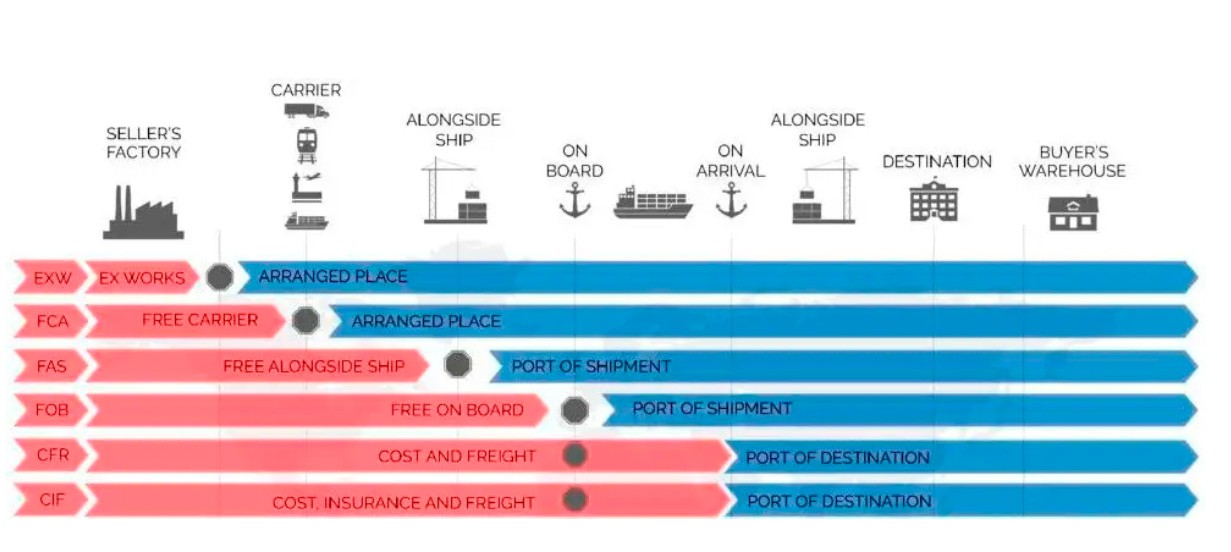Some Trade knowledge About Logistics
EXW: Abbreviation of "EX Works", which means "Delivered at the factory (named place)". By using this term, the seller is responsible for placing the goods at the disposal of the buyer at its premises (factory, workshop, warehouse, etc.).
FCA: Abbreviation of "Free Carrier". Using this term, the seller is responsible for handling the export customs clearance of the goods, delivering the goods to the carrier designated by the buyer at the time and place agreed in the contract, and notifying the buyer in time.
CPT: Carriage Paid to, which means that the seller shall, at his own expense, enter into a contract of Carriage and pay the Carriage of the goods to the specified destination. After going through the customs clearance formalities, the goods shall be handed over to the carrier at the agreed time and designated place of shipment, and the buyer shall be informed in time.
CIP: stands for "Carriage and Insurance Paid to", which means" Carriage and Insurance Paid to the designated destination ". By using this term, the seller shall, at his own expense, enter into a contract of carriage and pay the freight for the carriage of the goods to the destination, and shall be responsible for handling the insurance and paying the insurance premium. After going through the customs clearance formalities of the goods, the carrier shall take care of the goods at the designated place of shipment to fulfill its delivery obligations.
DAT: Delivered At Terminal (insert named Terminal port or place of destination). Using this term, the seller delivers the goods to the terminal of transport at the port or destination specified in the contract within the date or period agreed in the contract and discharges the goods from the arrival vehicle for disposal by the buyer.
DAP: "Delivered At Place" (insertnamed port of destination) To use this term, the seller must enter into a contract of carriage to pay for the freight incurred in carrying the goods to or at an agreed point within a named destination; Delivery will be completed when the goods in accordance with the contract are placed on the transport vehicle that has arrived at the buyer's disposal at the designated destination.
DDP: "Delivered Duty Paid" (named place of destination). "Delivered duty paid (... "Designated destination" refers to the seller at the designated destination, after handling the import customs clearance procedures, the goods on the delivery vehicle has not been unloaded to the buyer, complete delivery. The seller must bear all risks and expenses of transporting the goods to the designated destination, including any "taxes" (including the liability and risk of customs formalities, as well as handling charges, duties, duties and other charges) payable at the destination when customs formalities are required. The buyer bears the greatest responsibility under the EXW term, while the seller bears the greatest responsibility under the DDP term. This term should not be used if the seller cannot obtain an import licence directly or indirectly.
FAS: it stands for "Free Alongside "(named port of shipment). Using this term, the seller is responsible for placing the goods on a quay or barge near the ship at the port of shipment to complete delivery.
FOB: Is Free on Board or Freight on Board, its Chinese meaning is "Free on Board (....) Named port of shipment). In the use of this term, the seller shall be responsible for clearing export customs, delivering the goods to the vessel designated by the Buyer at the port of shipment and within the time specified in the contract, bearing all risks before the goods cross the vessel's rail at the port of shipment and notifying the Buyer promptly.
The risk transfer rules in this article have been amended by INcoterms 2010. The risk is transferred to the buyer after the goods are loaded on board the ship at the port of shipment. (The risk transfer over the ship's rail as stipulated in the 2000 General Rules of Interpretation is not easy to prove, so it is modified.)
Using this term, the Seller is responsible for chartering and paying Freight to the port of destination on the usual terms, loading the goods on board the contracted port of shipment and the time of shipment and advising the Buyer promptly.
CIF: namely, the English abbreviation of "Cost Insurance and Freight", its Chinese meaning is" Cost plus Insurance, Freight". Using this term, the seller is responsible for charting and paying freight to the port of destination on the usual terms, loading the goods on board the vessel at the contracted port of shipment and within the time of shipment and for insuring the goods and paying the insurance premium.





